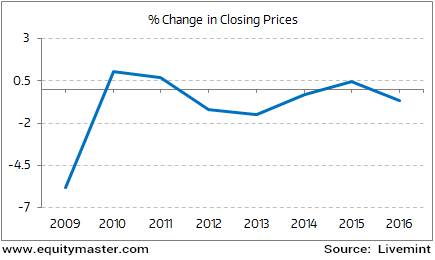India's Third Giant Leap
This Could be One of the Biggest Opportunities for Investors
- Home
- Todays Market
- Indian Stock Market News January 20, 2017
Sensex Trades in the Red; Metal Stocks Witness Selling Fri, 20 Jan 01:30 pm
After opening the day on a negative note, the Indian share markets have continued the trend and are trading below the dotted line. With the exception of stocks in the FMCG sector, all the sectoral indices are trading on a negative note with stocks in the metals sector and the PSU sector leading the losses.
The BSE Sensex is trading down by 210 points (down 0.8%) and the NSE Nifty is trading down by 62 points (down 0.7%). Meanwhile, the BSE Mid Cap index is trading down by 0.8% while the BSE Small Cap index is down by 0.5%. The rupee is trading at 68.13 to the US$.
According to an article in Livemint, the Securities Exchange Board of India (SEBI) is likely to impose stricter margin trading norms, create special liquidity window on the budget day to combat potential market volatility. The Union budget is scheduled to be presented on 1 February.
Additionally, to mitigate potential liquidity risks arising out of any possible large-scale redemption in mutual funds on budget day, SEBI and the Reserve Bank of India (RBI) are in discussions to create a special liquidity window.
SEBI is proposing to shift margin trades to square-off mode at 80-85% of their eligible limit rather than 90-95% currently.
Just Released: Multibagger Stocks Guide
(2017 Edition)
In this report, we reveal four proven strategies to picking multibagger stocks.
Well over a million copies of this report have already been claimed over the years.
Go ahead, grab your copy today. It's Free. Click here!

Margin orders - where you pay only a percentage of the actual value of the trade - placed during the day are squared off either at the end of the day or once the trading entity reaches a pre-determined eligible limit during the trading hours. This is generally used as a containment measure.
Normally, too much tightening in margin trading is avoided because the brokers may have to arrange for a large amount of money and they may be forced to square off trades at a loss.
If the SEBI goes ahead with the proposed norms, as and when the margin call reaches close to 80-85%, brokers will be asked to first pay the outstanding amount and reinstate the margin money before building further positions.
Stock markets can become volatile on budget day. While the past seven years saw the Sensex's budget day close change less than 2% of the previous day's, there have been instances when the markets have seen wild moves-for instance, Pranab Mukherjee's 2009-10 budget when the Sensex closed 5.83% lower.
How Markets Have Reacted on Budget Day

Volatility is an inherent part of dealing with Mr. Market. However, market volatility in the long run, doesn't really affect fundamentally sound companies with a proven track record. These companies with strong fundamentals can easily ride over the volatility and uncertainties in the markets. All that remains fundamentally analyzing and zeroing in on such companies. We've done all the work for you.
Moving on to news from stocks in the IT sector. In a news that has potential to hurt the Indian IT industry, two powerful US Senators have announced they will introduce a legislation which, if passed by the Congress, would give preference to foreigners studying in American universities, a move that will tighten the noose around the H1B visa programme and could hurt Indian IT firms.
The bill - to be introduced by Senator Chuck Grassley and Dick Durban - will require US Citizenship and Immigration Services to prioritize for the first time annual allocation of H-1B visas. It will ensure the "best and brightest" students being educated in the US receive preference for an H-1B visa, a statement issued by the Senators said.
This would put a dent to the Indian IT firm's strategy of exporting large numbers of H-1B and L1 workers for temporary training purposes to the US, only to send the workers back to their home countries to do the same job. Effectively outsourcing American jobs at a fraction of the costs.
The proposed bill, if introduced will require these firms to hire US citizens, or those educated from US universities, effectively raising labor costs manifold. This would spell doom for major Indian outsourcing companies as they garner most of their profits from the skilled labor arbitrage, with the same job done by Indian IT workers at a fraction of the costs.
The bill among other things would crack down on outsourcing companies that import large numbers of H-1B and L-1 workers for temporary training purposes only to send the workers back to their home countries to do the same job.Specifically, it would prohibit companies with more than 50 employees, of which at least half are H-1B or L-1 holders, from hiring additional H-1B employees, the statement released by the senators said.
With the United States looking to restrict the usage of H-1B visas, Indian companies such as TCS, Infosys and Wipro may have to hire more in the US, which may increase costs. It remains to be seen how the Indian IT firms will cope with the added costs and uncertainties in the US.
For information on how to pick stocks that have the potential to deliver big returns, download our special report now!
Read the latest Market Commentary


Equitymaster requests your view! Post a comment on "Sensex Trades in the Red; Metal Stocks Witness Selling". Click here!
Comments are moderated by Equitymaster, in accordance with the Terms of Use, and may not appear
on this article until they have been reviewed and deemed appropriate for posting.
In the meantime, you may want to share this article with your friends!